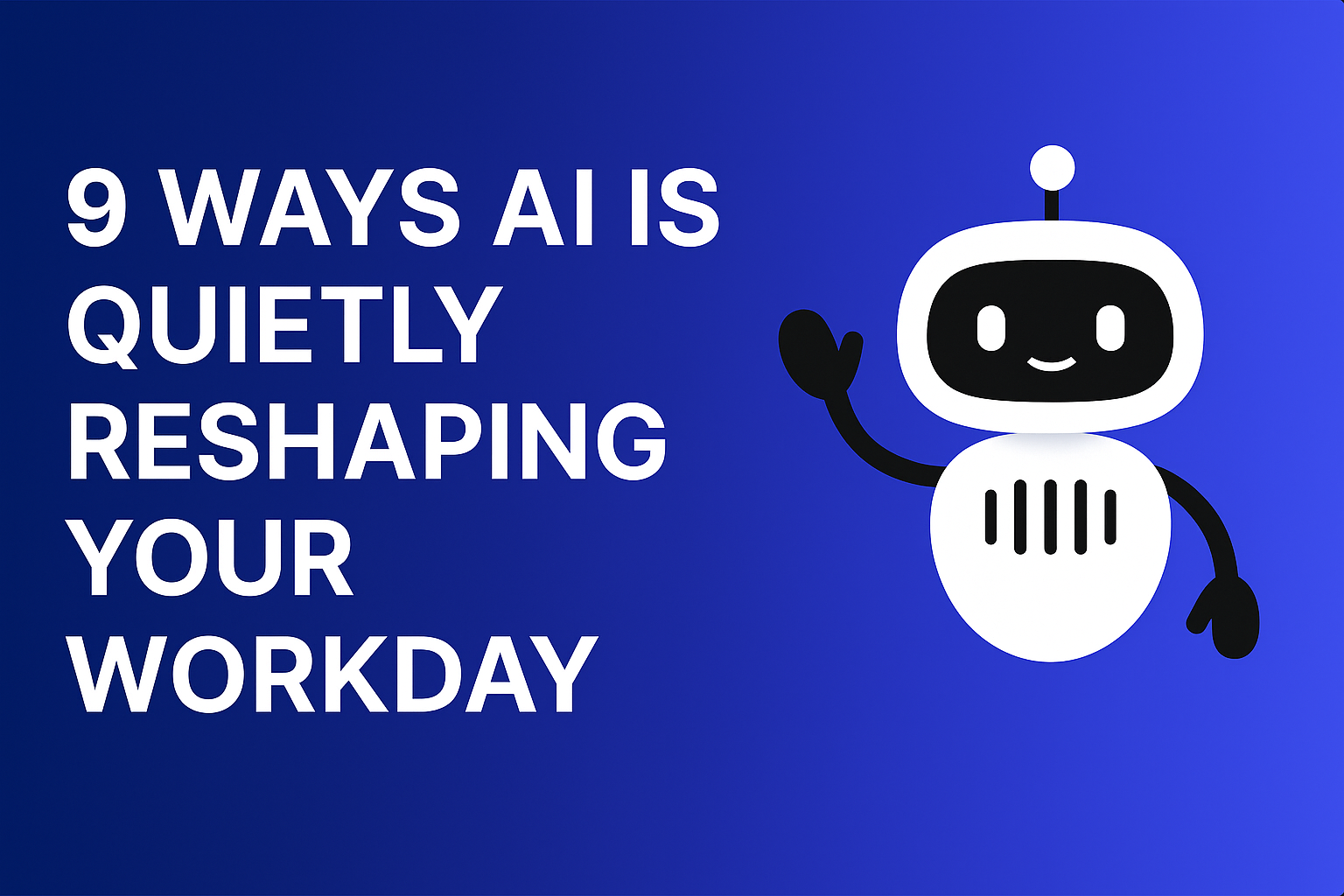9 Ways AI Is Quietly Reshaping Your Workday (And You Didn’t Even Notice)

Admin
Author

We often think of AI as futuristic or disruptive. But the truth is, AI is already embedded into the fabric of your daily work—often in ways so subtle, you may not even realize it’s there.
While big-picture debates about AI ethics, job displacement, and regulation continue, what’s really happening at the ground level is quieter, more practical, and already changing how we do our jobs.
This isn’t about robots replacing humans.
It’s about intelligent systems enhancing human workflows—streamlining decisions, removing admin work, and automating the parts of your day that don’t need your brain.
Let’s break it down.
1. Your Calendar Is More Autonomous Than You Think
From suggesting optimal meeting slots to preventing double-bookings, calendar tools now use machine learning to analyze patterns in your availability, scheduling behavior, and event types.
What’s happening:
Google Calendar predicts meeting times based on team habits
AI scheduling assistants (like Reclaim or Clockwise) block focus time automatically
Suggestions now factor in meeting fatigue, time zone fairness, and even recovery gaps
The impact:
Your calendar is doing more than organizing—it’s protecting your energy and optimizing your time.
2. Your Email Inbox Is Filtered by Machines
Priority inboxes, smart replies, and spam filters are all driven by trained AI models. What once felt like chaos is now curated.
What’s happening:
Gmail classifies emails as important, promotional, or social—before you read them
Tools like Superhuman and Hey use intent-based AI to surface urgent conversations
Smart compose features even suggest entire email responses
The impact:
You process communication faster, respond smarter, and ignore more noise—with AI doing the triage.
3. Your Meetings Are Being Captured and Condensed by AI
You’re no longer expected to remember everything. Tools like KaraX.ai, Otter, and Fathom use NLP to join your meetings, transcribe them, and deliver focused summaries within minutes.
What’s happening:
AI captures who said what, what decisions were made, and what to follow up on
Post-call summaries are sent automatically, no note-taking required
You can search for quotes, action items, or even objections across meetings
The impact:
Meeting knowledge becomes persistent, searchable, and shareable—freeing you to engage instead of scribble.
4. Task Management Is Becoming Predictive
Platforms like Notion, Asana, and ClickUp are evolving from static task boards into adaptive systems that prioritize, delegate, and re-assign based on bandwidth and deadlines.
What’s happening:
AI detects when tasks are at risk of delay and alerts you
Workflows auto-assign recurring tasks to the best-fit team members
Some tools now suggest what to work on next, based on urgency and context
The impact:
You stop managing tasks manually. Your tools start thinking like a project manager.
5. Content Isn’t Just Written—It’s Co-Created
Writers, marketers, and operators are all using tools like ChatGPT, Jasper, and Notion AI to generate ideas, outlines, drafts, and revisions.
What’s happening:
AI drafts blog intros, rewrites emails, and formats pitch decks
Teams collaborate by refining AI outputs instead of writing from scratch
Brand voice is preserved while output speed increases dramatically
The impact:
The creative process is shifting from “writer” to “editor.” AI handles the heavy lifting. You guide the direction.
6. You’re Making Decisions with AI Insights
Data analytics isn’t just about dashboards anymore. Modern platforms push insights to you before you ask—highlighting trends, anomalies, and opportunities.
What’s happening:
CRMs like Salesforce use AI to surface pipeline risks
Business intelligence tools like Looker and Power BI deliver predictive trends
Revenue platforms use call data to surface top-performing reps or messaging themes
The impact:
You don’t dig for insights. They find you—faster than any analyst could prepare them manually.
7. Time Tracking Is Becoming Invisible
Traditional time logs are being replaced by AI that tracks where you spend your time—and how you work—without constant manual input.
What’s happening:
Tools like Timely and Rize use AI to categorize your activities automatically
They detect context switches, idle time, and deep work periods
Weekly reports help optimize your productivity patterns
The impact:
You gain awareness without disruption—and spot inefficiencies you didn’t know existed.
8. You’re Already Delegating to AI Tools
From customer support chatbots to sales outreach assistants to meeting summarizers, more of your workflows now rely on AI as an unseen collaborator.
What’s happening:
AI assistants send calendar invites, format reports, and trigger reminders
Auto-generated meeting follow-ups are sent without lifting a finger
You offload dozens of micro-decisions to tools working 24/7
The impact:
You do less admin—and focus more on high-impact work.
9. You’re Working in an AI-Augmented Culture
Even if you’re not using these tools directly, your coworkers and team processes are.
What’s happening:
Hiring managers rely on AI-driven assessments
Designers use AI to prototype faster
Leaders use AI-generated insights to shape strategy
The impact:
AI isn’t just in your tool stack. It’s woven into your company’s operating system—and your workflow is changing as a result.
Final Thought: The Shift Is Quiet—But It’s Massive
The most powerful thing about AI at work isn’t that it’s loud.
It’s that it works in the background, rewiring how you do your job without needing your permission.
The modern professional isn’t just using AI—they’re collaborating with it, relying on it, and being shaped by it.
And the smartest thing you can do?
Pay attention to what’s already changing.
Then use it intentionally—before it becomes invisible.
See what that looks like in your meetings.
Try KaraX.ai and let AI take the notes, extract the actions, and help you focus on the work that actually matters.